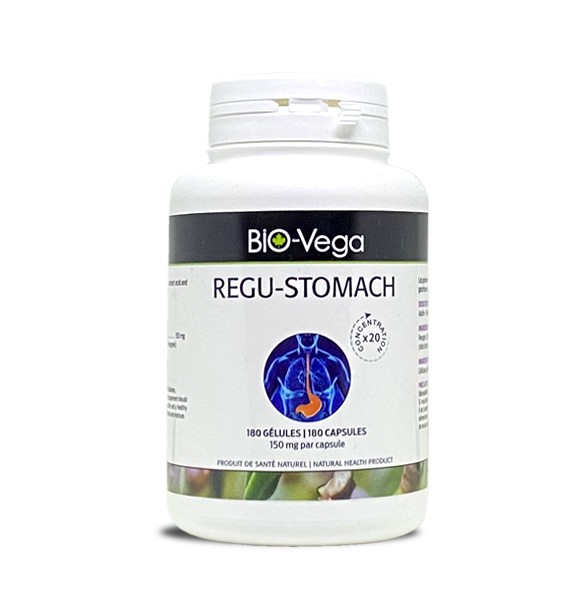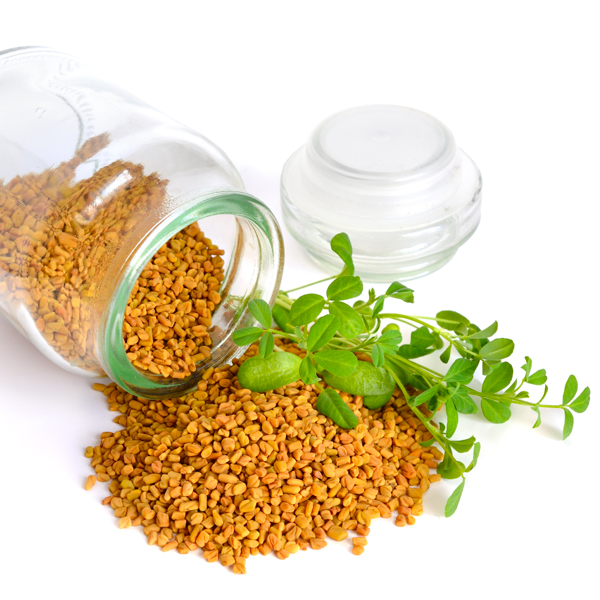






Last time this product was added to a cart: 01/12/2022
![]() Aid digestion and help relive stomach acid and heartburn.
Aid digestion and help relive stomach acid and heartburn.
![]() Fenugreek is known for its anti-ulcer and appetite stimulating effects
Fenugreek is known for its anti-ulcer and appetite stimulating effects
![]() Our Fenugreek extract is a 20: 1 concentrated extract. In other words, in order to produce a single 150 mg capsule, 3000 mg of fenugreek seed powder is used. It is therefore a highly concentrated and titrated extract!
Our Fenugreek extract is a 20: 1 concentrated extract. In other words, in order to produce a single 150 mg capsule, 3000 mg of fenugreek seed powder is used. It is therefore a highly concentrated and titrated extract!
• Pill box of 180 capsules.

Secure payment

Free shipping shopping above $60
BIO-Vega REGU-STOMACH capsules are mainly composed of fenugreek (seed).
Native to the Mediterranean basin and Asia, fenugreek (Trigonella foenum-graecum) is one of the oldest known medicinal and culinary plants in the world. Today, Fenugreek is known for its antiulcer and appetite stimulant effects. Several studies have been carried out to study the impact of fenugreek (Trigonella foenum graecum) on gastric ulcer1,2, in particular compared to drugs such as Omeprazole. They have demonstrated the powerful cytoprotective action of fenugreek seeds, mostly by :
• Its mucilages and galactomannans: with proven protective effects on the mucous membranes of the stomach and intestines, gastric function, the small intestine and the colon. Indeed, they help soothe gastrointestinal inflammation by forming some kind of protective coating on the walls.
• A rapid and powerful anti-secretory action: the active ingredients of fenugreek inhibit the secretion of hydrochloric acid by the parietal cells of the stomach.
• A powerful reducing effect of lipid peroxidation (induced by ethanol) and the deterioration of red blood cells by maintaining the activity of antioxidant enzymes (catalase and SOD). Lipid peroxidation plays a major role in inflammation of the gastric mucosa and formation of lesions.
This study also proved that fenugreek seeds are more effective than Omeprazole in preventing the formation of lesions.
• Fenugreek (Trigonella fœnum-graecum): 150 mg (20: 1, QBE * 3000 mg)
* Quantity Equivalent to 3000 mg
Finally, our fenugreek extract is subjected to a rigorous microbiological control in accordance with the criteria of the European pharmacopoeia and which also guarantees the absence of contaminants such as aflatoxins, pesticides, heavy metals and polycyclic aromatic hydrocarbons.
• Cellulose, hypromellose.
The non-medicinal ingredients are added to improve the bioavailability (absorption through the digestive system) of the active ingredients.
Adults: 1 capsule once or twice daily (provides an equivalent dose of 3000 mg of Trigonella fœnum-graecum).
• Relieves and prevents gastritis
• Powerful anti-ulcer
• Supports digestive comfort
• Helps support and balance fat metabolism
• Antacid
• Not recommended for people with diabetes without medical supervision, especially if they are taking medication to control their blood sugar.
• Not recommended for people receiving anticoagulant treatments.
• Consult a healthcare practitioner prior to use if you are pregnant.
• It is advisable not to exceed the recommended daily dose.
Food supplements can in no way replace a balanced and varied diet.
Do not exceed the recommended daily dose.
Keep out of the reach of children.
For pregnant and breastfeeding women, children or people undergoing medical treatment, always seek the advice of a healthcare professional.

Fenugreek is a Mediterranean leguminous plant, one of the oldest medicinal plants in human history. Very rich spice, it contains phosphorus, iron, sulfur, nicotinic acid, alkaloids, flavonoids, carbohydrates, vitamins A, B1, C, magnesium, calcium, lecithin, proteins (30%), and steroid saponins which contribute to the synthesis of cholesterol and fiber.
Today, fenugreek is known for its antiulcer and appetite stimulant effects.
Indeed, several studies have been carried out to study the impact of fenugreek (Trigonella foenum graecum) on gastric ulcer1,2, in particular compared to drugs such as Omeprazole. They have demonstrated the powerful cytoprotective action of fenugreek seeds, mostly by :
• Its mucilages and galactomannans: with proven protective effects on the mucous membranes of the stomach and intestines, gastric function, the small intestine and the colon. Indeed, they help soothe gastrointestinal inflammation by forming some kind of protective coating on the walls.
• A rapid and powerful anti-secretory action: the active ingredients of fenugreek inhibit the secretion of hydrochloric acid by the parietal cells of the stomach.
• A powerful reducing effect of lipid peroxidation (induced by ethanol) and the deterioration of red blood cells by maintaining the activity of antioxidant enzymes (catalase and SOD). Lipid peroxidation plays a major role in inflammation of the gastric mucosa and formation of lesions. This study also proved that fenugreek seeds are more effective than Omeprazole in preventing the formation of lesions.
All these observations show that fenugreek seeds have real anti-ulcer potential.
Studies carried out by teams of researchers have shown that fenugreek seeds contain an unconventional amino acid, 4-hydrox isoleucine, with particularly interesting insulin-stimulating properties3. In fact, by acting on the pancreatic cell, this molecule, which does not exist neither in humans or in animals, stimulates the secretion of insulin. The main advantage of hydroxy isoleucine is that its action is very different from sulfonylureas, insulin-stimulating agents currently used in the treatment of diabetes, since it has no side effects Hypoglycemic4. Of course, only 100% natural fenugreek extracts provide the useful contribution of 20% hydroxy isoleucine.
References:
1 Pandian RS1, Anuradha CV, Viswanathan P. Gastroprotective effect of fenugreek seeds (Trigonella foenum graecum) on experimental gastric ulcer in rats. J Ethnopharmacol. 2002 Aug;81(3):393-7.
2 H.M. Helmy. Study the Effect of Fenugreek Seeds on Gastric Ulcer in Experimental Rats. World Journal of Dairy & Food Sciences 6 (2): 152-158, 2011.
3 Y. Sauvaire, P. Petit, C. Broca, M. Manteghetti, Y. Baissac, J. Fernandez-Alavarez, R. Gross, M.
Roye, A. Leconte, R. Gomis, G. Ribes ; 4-hydroxyisoleucine, Diabètes, 1998, 47, 206-210.
4 Jetté L, Harvey L, Eugeni K, Levens N., 4-Hydroxyisoleucine: a plant-derived treatment for metabolic syndrome, 2009 Apr;10(4):353-8
Bibliographie:
1. The addition of fenugreek extract (Trigonella foenum-graecum) to glucose feeding increases muscle glycogen resynthesis after exercise. B. C. Ruby et Al. Amino Acids. 2005
2. Effects of glycosides based fenugreek seed extract on serum testosterone levels of healthy sedentary male subjects: an exploratory double blind, placebo controlled, crossover study. Mahesh Mokashi et Al. Asian Journal of Pharmaceutical and Clinical Research. 2014
3. Effect of Trigonella foenum-graecum (fenugreek) seeds on glycaemic control and insulin resistance in type 2 diabetes mellitus: a double blind placebo controlled study. Gupta Aet Al. The Journal of the Association of Physicians of India. 2001
4. Immunomodulatory effects of fenugreek (Trigonella foenum graecum L.) extract in mice. Bilal Bin-Hafeez et Al. International Immunopharmacology. 2003
5. Trigonella foenum graecum (fenugreek) seed extract as an antineoplastic agent. P. Sur et Al. Phytoterapy Research. 2001 6. In vitro studies on antiradical and antioxidant activities of fenugreek (Trigonella foenum graecum) seeds. S. Kaviarasan et Al. Food Chemistry. 2007